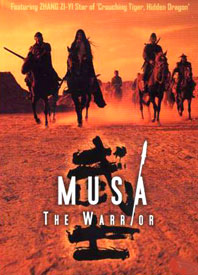 Musa the Warrior (Musa, 2001), also given as The Warrior, or even The Warrior Princess, is a Korean/Chinese co-production. It's much more realistic than is expected of Asian action films.
Musa the Warrior (Musa, 2001), also given as The Warrior, or even The Warrior Princess, is a Korean/Chinese co-production. It's much more realistic than is expected of Asian action films.
There are no flying kung-fu fighters on wires, no leaping over tall buildings in a single bound, no puffed up "my kung fu is better than your kung fu" encounters, not even good guys vs bad guys. This is real epic conflict in the medieval world.
The Englished title Musa the Warrior (aka, Musa the Warrior & the Princess of the Desert) is a slightly clumsy because there's is no character named Musa, which is a Korean word for a medieval knight or warrior, & not a personal name. But nothing else about the film is clumsy.
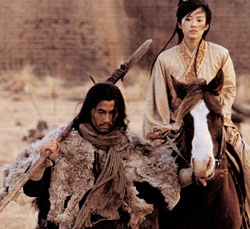 In a violent world of warring factions in 1375 China, a small band of Koreans from a failed diplomatic mission, headed up by General Choi Jung (Ju Jin-mo), are just trying against all odds to get back home to Korea. In a violent world of warring factions in 1375 China, a small band of Koreans from a failed diplomatic mission, headed up by General Choi Jung (Ju Jin-mo), are just trying against all odds to get back home to Korea.
This "quest for home" lends even the most brutal action scenes a sad soldierly nostalgia, the universal tragedy of fighting & dying far from family or nation.
It's hard enough to get back home across a landscape of hardships & warlords, but it's even more complicated when they encounter a Ming princess Bu Yong (Zhang Ziyi, starring also in House of Flying Daggers, 2004, & one of China's greatest actresses) who just might help them complete their original diplomatic mission if they will first help her.
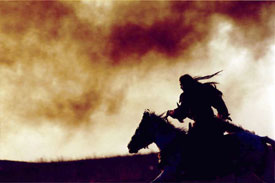 Just about everyone is bad & good; we have our favorites -- the archer Jinlib Dae-jung (Ahn Sung-kee) & the spear-baring mute slave-warrior Yeosol Ju-myeong (Jung Woo-sung) are such amazing figures -- but no one is all bad or all good, on any side. Just about everyone is bad & good; we have our favorites -- the archer Jinlib Dae-jung (Ahn Sung-kee) & the spear-baring mute slave-warrior Yeosol Ju-myeong (Jung Woo-sung) are such amazing figures -- but no one is all bad or all good, on any side.
Toward the end, as in Braveheart (1996), the battle scenes get to feel redundant, but they are great battle scenes horrifyingly convincing, set against breathtaking vistas.
Musa really is one of the world's cinemascope epics, deserving comparison to Akira Kurosawa's Ran (1985) & Kagemusha (1980) rather than, say, Shaw Brothers' kung fu epics; so no wonder in Japanese the Korean characters for Musa are read "Samurai."
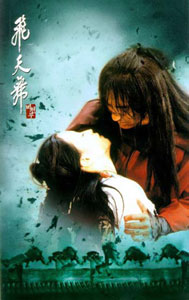 The gorgeous Korean epic set in medieval China, Bichunmoo; aka, Bichunmoo: Warrior of Virtue (2000) begins with silly wire-fu, flying warriors, warrior running on water, mixed with some better choreography, mixed with some magic sword cuts. The gorgeous Korean epic set in medieval China, Bichunmoo; aka, Bichunmoo: Warrior of Virtue (2000) begins with silly wire-fu, flying warriors, warrior running on water, mixed with some better choreography, mixed with some magic sword cuts.
It's full-on absurdism, based on & seeming like a comic book story. Though very silly, the costumes are so beautiful, the actors as comely as they are serious in demeanor, so that it kind of bamboozles itself into being appealing.
Since the action is to be unconvincing magic hoohah, the real charm of the story will have to be the romance of Sullie (Shin Hyun-june) & Jinha (Kim Hee-sun). At emotionalism & melodrama, their characters score truly high.
If you're ever capable of clutching your hands together at your heart & swooning over a medieval love story, this one's such an over-the-top angsty romance you might discover yourself crying over it even if you're not a twelve year old girl.
It's pictorially nicely done & was briefly the most expensive film ever produced in South Korea, though the far superior Musa the Warrior quickly broke the record.
Bichunmoo is frequently compared to Crouching Tiger, Hidden Dragon (2000), but that's kind of like comparing every epic fantasy novel with a dwarf in it to Lord of the Rings; it's pure Hope Springs Eternal hyperbole. Bichunmoo is a good film of kind, but it's no Crouching Tiger, which overcame all possibility of silliness to become, instead, a mystic poem.
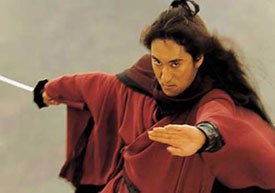 Jinha & Sullie have loved one another from childhood on; no two were ever more born for each other. When fate parts them, they swear to somehow return to one another. Jinha & Sullie have loved one another from childhood on; no two were ever more born for each other. When fate parts them, they swear to somehow return to one another.
Sullie's a wealthy Mongul lord's daughter by a concubine. Jinha, an orphan, has nothing beyond his Bichun secret sword skills, which allow for the stroke of a sword to cast its cutting power a considerable distance beyond the apparent reach of the steel.
When Jinha's uncle is wounded & near death, he reveals that Jinha is a half-Korean half-Mongul prince, & has been taught Binchun secret arts so he can avenge his family against the Han (Mongols).
Sullie meanwhile is being pressured into marrying Namgung Junkwang (Jeong Jin-yeong), the Han lord. This marriage would bring advantage to her Mongol family. But she waits only for Sinha, while her brothers conspire to keep them apart.
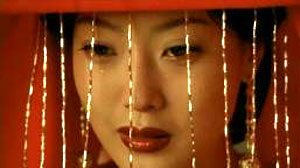 When Jinha happens to meet Namgung, they are quick friends, both excelling at martial arts. Namgung is otherwise a bit of a shit, dangerous to cross; but on the road, to a fellow master of fighting arts, he has only a chivalrous demeanor. When Jinha happens to meet Namgung, they are quick friends, both excelling at martial arts. Namgung is otherwise a bit of a shit, dangerous to cross; but on the road, to a fellow master of fighting arts, he has only a chivalrous demeanor.
Jinha knows Sullie's own father was the killer of his family, but at first he chooses love over vengeance. He takes his beloved to a cavern, where they reacquaint themselves with one another, & confirm their love.
In an action historical, however, even such odd pastoral moments cannot last, & confrontation with the young Han lord is inevitable. "Defeart me, then you can live!" says Namgung, who understandably cannot abide another man in Sullie's heart, friends though he & Sinha had been.
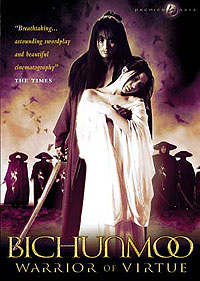 Our hero spares the Han lord at the critical moment of the fight, but Sullie's father, the true villain of the tale, unleashes his men's arrows. Jinha cannot deflect them all. He falls from the cliff like a pincushion into the sea. Our hero spares the Han lord at the critical moment of the fight, but Sullie's father, the true villain of the tale, unleashes his men's arrows. Jinha cannot deflect them all. He falls from the cliff like a pincushion into the sea.
Believing Jinha dead, Sullie agrees to wed the Han lord. Jinha, however, is discovered washed ashore, & nursed with curative seaweeds.
Time passes before Jinha has his chance, in a fierce & horrible encounterbattle with the cruel General Taruga (Kim Hak-cheol) on a bridge. When his beloved's father is slain, Jinha's family vengeance is achieved.
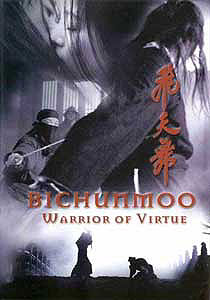 But by now he cannot just walk away, even should he desire to do so. He's become part of a band of assassins who would overthrow the Han rulers, so the bloodshed continues. And from the ruins of that battle he cannot reclaim Sullie, having as she does a son to protect from just such rebels. But by now he cannot just walk away, even should he desire to do so. He's become part of a band of assassins who would overthrow the Han rulers, so the bloodshed continues. And from the ruins of that battle he cannot reclaim Sullie, having as she does a son to protect from just such rebels.
Sung (Hyep Bang), Sullie's & Namgung's son, is not yet old enough to achieve revenge, but old enough to know what it means, & to desire it. He sets his mind against Jahalang, the rebel who brought down his father's capital while Lord Namgung was away.
Sung owes his life to a mysterious masked hero who seems to have appointed himself the young fellow's protector. Sung admires this fellow mightily, but is unaware he is the very Jahalong/Jinha against whom he desires revenge.
And when Sung begs upon his knees that the masked protector provide him a lesson in swordsmanship for the sake of that revenge, Jahalang, who is of course one & the same with Sinha, teaches him.
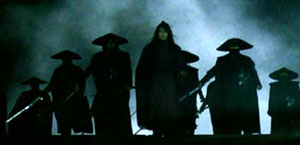 Since the evil General's death halfway through the tale, there has been no villain in the story. Everyone deserves happiness. Fate has arranged that none can have it. Many outcomes are possible, all gloomy one way or another. Since the evil General's death halfway through the tale, there has been no villain in the story. Everyone deserves happiness. Fate has arranged that none can have it. Many outcomes are possible, all gloomy one way or another.
Sung's mother Sullie is assassinated horribly by fire, a killing disguised as an accident. This was the work of the coniving young Lady Yeojin (Choi Yu-jeong; aka, Choi Jin-hie) who desired Jinha. When he refuses her advances, she turns femme fatale.
As a woman spurned, she poisons Sinha, & while he's spuewing blood, she turns him over to his enemies. He awakens in a torture pit with men who want his Bichun secrets.
It had been quite the surprise that the female lead had been killed with much of this epic yet to unfold. So it's less surprising that she was not killed in the fire after all, having been saved by her brother.
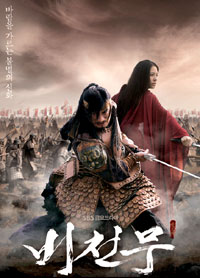 She joins a troupe of dancing girls to perform for the betrayer of both Lord Namgung, & Jinha, her hairpins to be her weapons. She joins a troupe of dancing girls to perform for the betrayer of both Lord Namgung, & Jinha, her hairpins to be her weapons.
The girl who poisoned Jinha & tried to assassinate Sullie has the Jinha brought to her. The poison she gave him is allegedly irriversible. Yet as she makes love to his dying body, it turns out this is the secret cure, which transfers the poison's corruption from his body to her own.
Upon her last breath she warns Jinha that her sacrifice cannot fully reverse the effects of the poison.
 If he exerts himself with swordplay before he regains the strength, the murderous effects of the toxin will resurface. If he exerts himself with swordplay before he regains the strength, the murderous effects of the toxin will resurface.
So naturally enough, with no concern for his own health, Jinha sets out to protect Sung, this time unmasked.
[SPOILERS ALERT!] By now he knows Sung is not Lord Namgung's son, but his own, so he will risk anything for the boy. And indeed he becomes ill from the poison. But what the heck, it's just a story, & the author decided he might as well just get well.
Improbably enough, father & son patch things up. In situations that could not possibly end up happily ever after, things begun to look up, since irreversible death for both hero & heroine has proven reversible after all, so yippy. But wait! Could it all still come to doom?
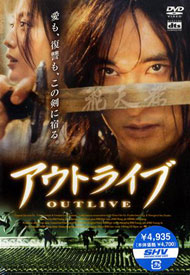 By the time of the formal duel between Lord Nangung & Jinha, neither wants to win, both want the other to care for Sullie. By the time of the formal duel between Lord Nangung & Jinha, neither wants to win, both want the other to care for Sullie.
It is one of the saddest most heroic moments in all martial cinema when one of them dies in the other's arms after saving his enemy's life. Of the numerous tragic moments of the tale, especially those bunched up at the end, really only this one is an unqualified success.
Lastly, we get a long-awaited display of Bichun fighting art from Jinha, who eradicates an entire army while he is dying of the poison.
This is followed by one more tragedy weakened only by the fact that crazed heaps of tragedies one after another have the unintended accumulative effect of humor. [END SPOILER ALERT]
Not only do the relentless sad bits begin to seem satiric after the tenth go-around, but the Binchun secrets of exploding bodies by swishing a sword from a distance is just plain stupid. Turning the sword into a magic canon is stupider still. But the main fault of the film is that it never decided on which tragic end to keep & which nine to throw out, so it kept them all.
Despite that it is all just as silly as silly gets, Bichunmoo nevertheless entertains, especially if you're already used to the absurdities of Hong Kong wuxia & are therefore primed & ready for this Korean take on the same levil of cartoony action.
copyright © by Paghat the Ratgirl
|
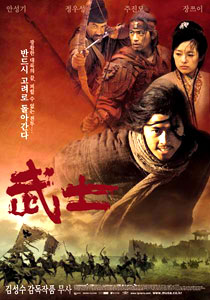

 In a violent world of warring factions in 1375 China, a small band of Koreans from a failed diplomatic mission, headed up by General Choi Jung (Ju Jin-mo), are just trying against all odds to get back home to Korea.
In a violent world of warring factions in 1375 China, a small band of Koreans from a failed diplomatic mission, headed up by General Choi Jung (Ju Jin-mo), are just trying against all odds to get back home to Korea. Just about everyone is bad & good; we have our favorites -- the archer Jinlib Dae-jung (Ahn Sung-kee) & the spear-baring mute slave-warrior Yeosol Ju-myeong (Jung Woo-sung) are such amazing figures -- but no one is all bad or all good, on any side.
Just about everyone is bad & good; we have our favorites -- the archer Jinlib Dae-jung (Ahn Sung-kee) & the spear-baring mute slave-warrior Yeosol Ju-myeong (Jung Woo-sung) are such amazing figures -- but no one is all bad or all good, on any side.
 Jinha & Sullie have loved one another from childhood on; no two were ever more born for each other. When fate parts them, they swear to somehow return to one another.
Jinha & Sullie have loved one another from childhood on; no two were ever more born for each other. When fate parts them, they swear to somehow return to one another. When Jinha happens to meet Namgung, they are quick friends, both excelling at martial arts. Namgung is otherwise a bit of a shit, dangerous to cross; but on the road, to a fellow master of fighting arts, he has only a chivalrous demeanor.
When Jinha happens to meet Namgung, they are quick friends, both excelling at martial arts. Namgung is otherwise a bit of a shit, dangerous to cross; but on the road, to a fellow master of fighting arts, he has only a chivalrous demeanor. Our hero spares the Han lord at the critical moment of the fight, but Sullie's father, the true villain of the tale, unleashes his men's arrows. Jinha cannot deflect them all. He falls from the cliff like a pincushion into the sea.
Our hero spares the Han lord at the critical moment of the fight, but Sullie's father, the true villain of the tale, unleashes his men's arrows. Jinha cannot deflect them all. He falls from the cliff like a pincushion into the sea. But by now he cannot just walk away, even should he desire to do so. He's become part of a band of assassins who would overthrow the Han rulers, so the bloodshed continues. And from the ruins of that battle he cannot reclaim Sullie, having as she does a son to protect from just such rebels.
But by now he cannot just walk away, even should he desire to do so. He's become part of a band of assassins who would overthrow the Han rulers, so the bloodshed continues. And from the ruins of that battle he cannot reclaim Sullie, having as she does a son to protect from just such rebels. Since the evil General's death halfway through the tale, there has been no villain in the story. Everyone deserves happiness. Fate has arranged that none can have it. Many outcomes are possible, all gloomy one way or another.
Since the evil General's death halfway through the tale, there has been no villain in the story. Everyone deserves happiness. Fate has arranged that none can have it. Many outcomes are possible, all gloomy one way or another. She joins a troupe of dancing girls to perform for the betrayer of both Lord Namgung, & Jinha, her hairpins to be her weapons.
She joins a troupe of dancing girls to perform for the betrayer of both Lord Namgung, & Jinha, her hairpins to be her weapons. If he exerts himself with swordplay before he regains the strength, the murderous effects of the toxin will resurface.
If he exerts himself with swordplay before he regains the strength, the murderous effects of the toxin will resurface. By the time of the formal duel between Lord Nangung & Jinha, neither wants to win, both want the other to care for Sullie.
By the time of the formal duel between Lord Nangung & Jinha, neither wants to win, both want the other to care for Sullie.